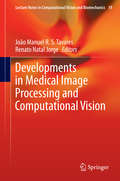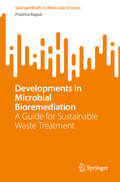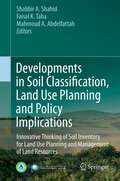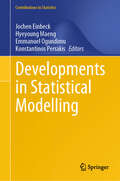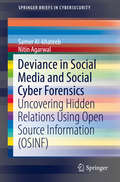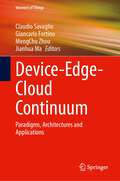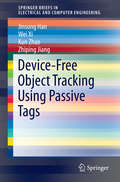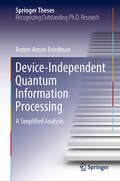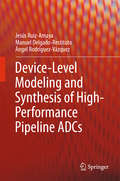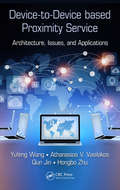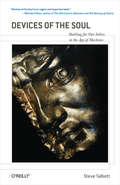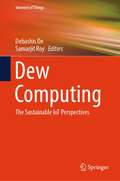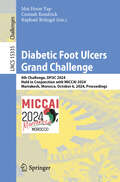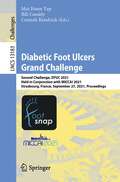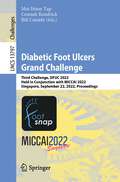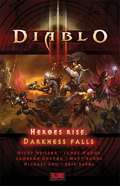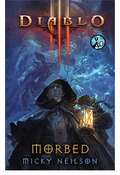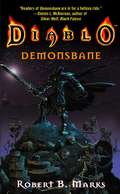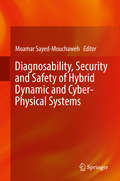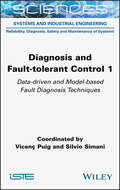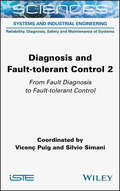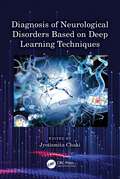- Table View
- List View
Developments in Medical Image Processing and Computational Vision
by João Manuel R. S. Tavares Renato Natal JorgeThis book presents novel and advanced topics in Medical Image Processing and Computational Vision in order to solidify knowledge in the related fields and define their key stakeholders. It contains extended versions of selected papers presented in VipIMAGE 2013 - IV International ECCOMAS Thematic Conference on Computational Vision and Medical Image, which took place in Funchal, Madeira, Portugal, 14-16 October 2013. The twenty-two chapters were written by invited experts of international recognition and address important issues in medical image processing and computational vision, including: 3D vision, 3D visualization, colour quantisation, continuum mechanics, data fusion, data mining, face recognition, GPU parallelisation, image acquisition and reconstruction, image and video analysis, image clustering, image registration, image restoring, image segmentation, machine learning, modelling and simulation, object detection, object recognition, object tracking, optical flow, pattern recognition, pose estimation, and texture analysis. Different applications are addressed and described throughout the book, comprising: biomechanical studies, bio-structure modelling and simulation, bone characterization, cell tracking, computer-aided diagnosis, dental imaging, face recognition, hand gestures detection and recognition, human motion analysis, human-computer interaction, image and video understanding, image processing, image segmentation, object and scene reconstruction, object recognition and tracking, remote robot control, and surgery planning. This volume is of use to researchers, students, practitioners and manufacturers from several multidisciplinary fields, such as artificial intelligence, bioengineering, biology, biomechanics, computational mechanics, computational vision, computer graphics, computer science, computer vision, human motion, imagiology, machine learning, machine vision, mathematics, medical image, medicine, pattern recognition, and physics.
Developments in Microbial Bioremediation: A Guide for Sustainable Waste Treatment (SpringerBriefs in Molecular Science)
by Pratima BajpaiThis book sheds new light on the transformative role of microorganisms in waste management, offering a comprehensive overview of microbial waste management strategies and their applications. Through this book, readers will learn about the latest advancements in bioremediation and microbial consortia technology, providing a fresh perspective on sustainable waste treatment solutions. The chapters cover topics such as the types and origins of waste, the importance of microorganisms in various waste management processes, and the benefits of bioremediation compared to traditional methods. Readers will discover diverse strategies for managing microbial waste, including bioleaching, bioaugmentation, and utilizing microorganisms to aid phytoremediation. The book also discusses the combined use of bacteria and microalgae for wastewater treatment and emerging innovations in microbial consortia technology. Critical attention is given to the role of microbes in multiple industrial applications such as pharmaceuticals, food processing, textiles, explosives, distilleries, and petrochemicals. Additionally, it explores bioinformatics approaches like genomics and proteomics that drive bioremediation efforts. This volume is an essential resource for researchers in environmental science, biotechnology professionals focusing on sustainable practices, scholars studying advanced wastewater treatment methods using nanotechnology or plant species integration with microorganisms. It invites readers to think through critical questions about sustainable waste treatment practices while offering valuable insights into future perspectives on microbial waste management.
Developments in Soil Classification, Land Use Planning and Policy Implications
by Shabbir A. Shahid Mahmoud A. Abdelfattah Faisal K. TahaAs the world's population continues to expand, maintaining and indeed increasing agricultural productivity is more important than ever, though it is also more difficult than ever in the face of changing weather patterns that in some cases are leading to aridity and desertification. The absence of scientific soil inventories, especially in arid areas, leads to mistaken decisions about soil use that, in the end, reduce a region's capacity to feed its population, or to guarantee a clean water supply. Greater efficiency in soil use is possible when these resources are properly classified using international standards. Focusing on arid regions, this volume details soil classification from many countries. It is only once this information is properly assimilated by policymakers it becomes a foundation for informed decisions in land use planning for rational and sustainable uses.
Developments in Statistical Modelling (Contributions to Statistics)
by Jochen Einbeck Hyeyoung Maeng Emmanuel Ogundimu Konstantinos PerrakisThis volume on the latest developments in statistical modelling is a collection of refereed papers presented at the 38th International Workshop on Statistical Modelling, IWSM 2024, held from 14 to 19 July 2024 in Durham, UK. The contributions cover a wide range of topics in statistical modelling, including generalized linear models, mixture models, regularization techniques, hidden Markov models, smoothing methods, censoring and imputation techniques, Gaussian processes, spatial statistics, shape modelling, goodness-of-fit problems, and network analysis. Various highly topical applications are presented as well, especially from biostatistics. The approaches are equally frequentist and Bayesian, a categorization the statistical modelling community has synergetically overcome. The book also features the workshop’s keynote contribution on statistical modelling for big and little data, highlighting that both small and large data sets come with their own challenges. The International Workshop on Statistical Modelling (IWSM) is the annual workshop of the Statistical Modelling Society, with the purpose of promoting important developments, extensions, and applications in statistical modelling, and bringing together statisticians working on related problems from various disciplines. This volume reflects this spirit and contributes to initiating and sustaining discussions about problems in statistical modelling and triggers new developments and ideas in the field.
Deviance in Social Media and Social Cyber Forensics: Uncovering Hidden Relations Using Open Source Information (OSINF) (SpringerBriefs in Cybersecurity)
by Nitin Agarwal Samer Al-khateebThis book describes the methodologies and tools used to conduct social cyber forensic analysis. By applying these methodologies and tools on various events observed in the case studies contained within, their effectiveness is highlighted. They blend computational social network analysis and cyber forensic concepts and tools in order to identify and study information competitors. Through cyber forensic analysis, metadata associated with propaganda-riddled websites are extracted. This metadata assists in extracting social network information such as friends and followers along with communication network information such as networks depicting flows of information among the actors such as tweets, replies, retweets, mentions, and hyperlinks. Through computational social network analysis, the authors identify influential actors and powerful groups coordinating the disinformation campaign. A blended social cyber forensic approach allows them to study cross-media affiliations of the information competitors. For instance, narratives are framed on blogs and YouTube videos, and then Twitter and Reddit, for instance, will be used to disseminate the message. Social cyber forensic methodologies enable researchers to study the role of modern information and communication technologies (ICTs) in the evolution of information campaign and coordination. In addition to the concepts and methodologies pertaining to social cyber forensics, this book also offers a collection of resources for readers including several datasets that were collected during case studies, up-to-date reference and literature surveys in the domain, and a suite of tools that students, researchers, and practitioners alike can utilize. Most importantly, the book demands a dialogue between information science researchers, public affairs officers, and policy makers to prepare our society to deal with the lawless “wild west” of modern social information systems triggering debates and studies on cyber diplomacy.
Device-Edge-Cloud Continuum: Paradigms, Architectures and Applications (Internet of Things)
by Giancarlo Fortino Jianhua Ma MengChu Zhou Claudio SavaglioThis book focuses on both theoretical and practical aspects of the “Device-Edge-Cloud continuum”, a development approach aimed at the seamless provision of next-generation cyber-physical services through the dynamic orchestration of heterogeneous computing resources, located at different distances to the user and featured by different peculiarities (high responsiveness, high computing power, etc.). The book specifically explores recent advances in paradigms, architectures, models, and applications for the “Device-Edge-Cloud continuum”, which raises many 'in-the-small' and 'in-the-large' issues involving device programming, system architectures and methods for the development of IoT ecosystem. In this direction, the contributions presented in the book propose original solutions and aim at relevant domains spanning from healthcare to industry, agriculture and transportation.
Device-Free Object Tracking Using Passive Tags
by Jinsong Han Wei Xi Kun Zhao Zhiping JiangThis SpringerBrief examines the use of cheap commercial passive RFID tags to achieve accurate device-free object-tracking. It presents a sensitive detector, named Twins, which uses a pair of adjacent passive tags to detect uncooperative targets (such as intruders). Twins leverages a newly observed phenomenon called critical state that is caused by interference among passive tags. The author expands on the previous object tracking methods, which are mostly device-based, and reveals a new interference model and their extensive experiments for validation. A prototype implementation of the Twins-based intrusion detection scheme with commercial off-the-shelf reader and tags is also covered in this SpringerBrief. Device-Free Object Tracking Using Passive Tags is designed for researchers and professionals interested in smart sensing, localization, RFID and Internet of Things applications. The content is also useful for advanced-level students studying electrical engineering and computer science.
Device-Independent Quantum Information Processing: A Simplified Analysis (Springer Theses)
by Rotem Arnon-FriedmanDevice-independent quantum cryptography is a method for exchanging secret messages over potentially insecure quantum communication channels, such as optical fibers. In contrast to conventional quantum cryptography, security is guaranteed even if the devices used by the communication partners, such as photon sources and detectors, deviate from their theoretical specifications. This is of high practical relevance, for attacks to current implementations of quantum cryptography exploit exactly such deviations. Device-independent cryptography is however technologically so demanding that it looked as if experimental realizations are out of reach.In her thesis, Rotem Arnon-Friedman presents powerful information-theoretic methods to prove the security of device-independent quantum cryptography. Based on them, she is able to establish security in a parameter regime that may be experimentally achievable in the near future. Rotem Arnon-Friedman's thesis thus provides the theoretical foundations for an experimental demonstration of device-independent quantum cryptography.
Device-Level Modeling and Synthesis of High-Performance Pipeline ADCs
by Jesús Ruiz-Amaya Ángel Rodríguez-Vázquez Manuel Delgado-RestitutoThis book presents models and procedures to design pipeline analog-to-digital converters, compensating for device inaccuracies, so that high-performance specs can be met within short design cycles. These models are capable of capturing and predicting the behavior of pipeline data converters within less than half-a-bit deviation, versus transistor-level simulations. As a result, far fewer model iterations are required across the design cycle. Models described in this book accurately predict transient behaviors, which are key to the performance of discrete-time systems and hence to the performance of pipeline data converters.
Device-to-Device based Proximity Service: Architecture, Issues, and Applications
by Athanasios V. Vasilakos Qun Jin Yufeng Wang Hongbo ZhuD2D-based proximity service is a very hot topic with great commercial potential from an application standpoint. Unlike existing books which focus on D2D communications technologies, this book fills a gap by summarizing and analyzing the latest applications and research results in academic, industrial fields, and standardization. The authors present the architecture, fundamental issues, and applications in a D2D networking environment from both application and interdisciplinary points of view.
Devices of the Soul: Battling for Our Selves in an Age of Machines
by Steve Talbott"Self-forgetfulness is the reigning temptation of the technological era. This is why we so readily give our assent to the absurd proposition that a computer can add two plus two, despite the obvious fact that it can do nothing of the sort--not if we have in mind anything remotely resembling what we do when we add numbers. In the computer's case, the mechanics of addition involve no motivation, no consciousness of the task, no mobilization of the will, no metabolic activity, no imagination. And its performance brings neither the satisfaction of accomplishment nor the strengthening of practical skills and cognitive capacities."In this insightful book, author Steve Talbott, software programmer and technical writer turned researcher and editor for The Nature Institute, challenges us to step back and take an objective look at the technology driving our lives. At a time when 65 percent of American consumers spend more time with their PCs than they do with their significant others, according to a recent study, Talbott illustrates that we're forgetting one important thing--our Selves, the human spirit from which technology stems.Whether we're surrendering intimate details to yet another database, eschewing our physical communities for online social networks, or calculating our net worth, we freely give our power over to technology until, he says, "we arrive at a computer's-eye view of the entire world of industry, commerce, and society at large...an ever more closely woven web of programmed logic."Digital technology certainly makes us more efficient. But when efficiency is the only goal, we have no way to know whether we're going in the right or wrong direction. Businesses replace guiding vision with a spreadsheet's bottom line. Schoolteachers are replaced by the computer's dataflow. Indigenous peoples give up traditional skills for the dazzle and ease of new gadgets. Even the Pentagon's zeal to replace "boots on the ground" with technology has led to the mess in Iraq. And on it goes.The ultimate danger is that, in our willingness to adapt ourselves to technology, "we will descend to the level of the computational devices we have engineered--not merely imagining ever new and more sophisticated automatons, but reducing ourselves to automatons."To transform our situation, we need to see it in a new and unaccustomed light, and that's what Talbott provides by examining the deceiving virtues of technology--how we're killing education, socializing our machines, and mechanizing our society.Once you take this eye-opening journey, you will think more clearly about how you consume technology and how you allow it to consume you."Nothing is as rare or sorely needed in our tech-enchanted culture right now as intelligent criticism of technology, and Steve Talbott is exactly the critic we've been waiting for: trenchant, sophisticated, and completely original. Devices of the Soul is an urgent and important book."--Michael Pollan, author of The Omnivore's Dilemma: A Natural History of Four Meals and The Botany of Desire: A Plant's Eye View of the World"Steve Talbott is a rare voice of clarity, humanity, and passion in a world enthralled by machines and calculation. His new book, Devices of the Soul, lays out a frightening and at the same time inspiring analysis of what computers and computer-like thinking are doing to us, our children, and the future of our planet. Talbott is no Luddite. He fully understands and appreciates the stunning power of technology for both good and evil. His cool and precise skewering of the fuzzy thinking and mindless enthusiasm of the technology true believers is tempered by his modesty, the elegance of his writing, and his abiding love for the world of nature and our capacity for communion with it. "--Edward Miller, Former editor, Harvard Education Letter"Those who care about the healthy and wholesome lives of children can gain much from Steve Talbott's wisdom. He examines the need to help children spe
Dew Computing: The Sustainable IoT Perspectives (Internet of Things)
by Debashis De Samarjit RoyThis book discusses the dew computing paradigm with the evolution of future-generation technologies through the cloud and the Internet of Things in the scope of machine intelligence. Dew computing is an emerging paradigm that inherits a flexible and super-hybrid methodology to afford personal information to users with self-regulating internetwork connectivity. The contents conceptualize how the end-users can benefit from data analytics through intelligent data sensing, computing, analytics, and distributed scenarios using a dew-cloud computational framework over the Internet of Things environment. The main focus of this book is to bring all the related technologies into a single platform so that undergraduate and postgraduate students, researchers, academicians, and the industry can easily understand dew computing, future generations of cloud computing, machine intelligence, and representation learning in IoT-enabled technologies.
Diabetic Foot Ulcers Grand Challenge: 4th Challenge, DFUC 2024, Held in Conjunction with MICCAI 2024, Marrakesh, Morocco, October 6, 2024, Proceedings (Lecture Notes in Computer Science #15335)
by Moi Hoon Yap Connah Kendrick Raphael BrüngelThis book constitutes the 4th Challenge on Diabetic Foot Ulcers, DFUC2024, held in conjunction with the 27th International Conference on Medical Image Computing and Computer-Assisted Intervention, MICCAI 2024, in Marrakesh, Morocco, on October 6, 2024. The 8 full papers presented in this book together with 2 invited papers were carefully reviewed and selected from 11 submissions. The task of DFUC 2024 was on self-supervised learning in ulcer segmentation, for the purpose of supporting research towards more advanced methods to overcome data deficiency and unlabelled data.
Diabetic Foot Ulcers Grand Challenge: Second Challenge, DFUC 2021, Held in Conjunction with MICCAI 2021, Strasbourg, France, September 27, 2021, Proceedings (Lecture Notes in Computer Science #13183)
by Moi Hoon Yap Bill Cassidy Connah KendrickThis book constitutes the Second Diabetic Foot Ulcers Grand Challenge, DFUC 2021, which was held on September 27, 2021, in conjunction with the 24th International Conference on Medical Image Computing and Computer-Assisted Intervention, MICCAI 2021. The challenge took place virtually due to the COVID-19 pandemic.The 6 full papers included in this book were carefully reviewed and selected from 14 submissions. There is also an overview paper on the challenge and datasets and one summary paper of DFUC 2021.
Diabetic Foot Ulcers Grand Challenge: Third Challenge, DFUC 2022, Held in Conjunction with MICCAI 2022, Singapore, September 22, 2022, Proceedings (Lecture Notes in Computer Science #13797)
by Moi Hoon Yap Bill Cassidy Connah KendrickThis book constitutes the Third Diabetic Foot Ulcers Grand Challenge, DFUC 2022, which was held on September 2022, in conjunction with the 25th International Conference on Medical Image Computing and Computer-Assisted Intervention, MICCAI 2022 in Singapore. The 8 full papers presented together with 5 challenge papers and 3 post-challenge papers included in this book were carefully reviewed and selected from 19 submissions.The DFU challenges aim to motivate the health care domain to share datasets, participate in ground truth annotation, and enable data-innovation in computer algorithm development. In the longer term, it will lead to improved patient care.
Diablo III: Heroes Rise, Darkness Falls
by Blizzard EntertainmentA collection of terrifying tales based on the award-winning video game! A bold demon hunter risks becoming her own worst enemy while tracking down her sinister prey...A haunted barbarian returns to his shattered homeland to face a harrowing past...A lone monk scours evil from an ancient forest where the line between friend and foe has vanished...A gifted but impetuous wizard finds out that great knowledge and power come with a price...A proud young witch doctor makes a chilling discovery that shakes his faith to its core...A desperate playwright embarks down a dark path of madness and depravity in his quest for fame...An unscrupulous wagon driver learns that his sole passenger is harboring a terrifying secret... These are stories from the world of Sanctuary, a land of mystery and dread that serves as the backdrop for Blizzard Entertainment's award-winning Diablo video game series. Although these narratives focus on different characters and settings, they are bound together by the web of horror and suspense that is intrinsic to the Diablo universe. In this gothic fantasy realm, terror is a constant. It comes in many forms, from grotesque horned demons to the deepest fears of mortal hearts and minds. Brace yourself for this collection of exciting and frightening tales that will keep you on the edge of your seat from start to finish.
Diablo III: Morbed
by Micky NeilsonAn original e-novella based on the bestselling video game!Morbed is a thief and a survivor, and his skills in both roles are about to be put to the ultimate test. Joining together with a wizard, a druid, a necromancer, and a crusader, Morbed has arrived at a remote island to track down an elusive vagabond andreclaim valuable items pilfered from the city of Westmarch. But there is something loose on the island, something that has killed and is very close to killing again. In order to leave the island alive, Morbed will be forced to confront not only the terrifying creature that stalks the forests, but the darkest corners of his own spirit as well.
Diablo III: Storm of Light (Diablo III)
by Nate KenyonThe High Heavens are healing after the fall of the Prime Evil. The Angiris Council has recovered the Black Soulstone and now stands vigil over the cursed artifact deep within the glimmering Silver City.Amid these momentous events, Tyrael struggles with his position as the new Aspect of Wisdom, feeling out of place as a mortal among his angelic brethren and doubting his ability to fully embody his role. As he searches within himself and the Heavens for reassurance, he senses the Black Soulstone's grim influence on his home. Where harmony of light and sound once reigned, a mounting discord is threatening to shroud the realm in darkness. Imperius and the other archangels vehemently oppose moving or destroying the crystal, leading Tyrael to put Heaven’s fate in the hands of humankind...Drawing powerful humans to his side from the far ends of Sanctuary, Tyrael reforges the ancient Horadrim and charges the order with an impossible task: to steal the Soulstone from the heart of Heaven. Among the champions entrustedwith this burden are Jacob of Staalbreak, former avatar of Justice and guardian of the angelic blade El'druin; Shanar, a wizard with phenomenal powers; Mikulov, a lithe and reverent monk; Gynvir, a fearless and battle-hardened barbarian; and Zayl, a mysterious necromancer. With time and the forces of both good and evil against them, can these heroes unite as one and complete their perilous mission before Heaven falls to ruin?
Diablo: Demonsbane
by Robert B. MarksSince the beginning of time, the angelic hosts of the High Heavens and the demonic hordes of the Burning Hells have been locked in a struggle for the fate of all creation. That struggle has now come to the mortal realm...and neither Man nor Demon nor Angel will be left unscathed.... What was to have been a victorious last stand against the demonic invasion of Entsteig has instead become a massacre. Only Siggard remains, a warrior unable to remember the final hours of the battle, driven by the carnage he experienced and the void in his mind to avenge those slain by the army of darkness. As he hunts the demon lord who butchered everything dear to him, Siggard also pieces together the truth of that terrible battle...and finds that his nightmare is only just beginning. An original tale of swords, sorcery, and timeless struggle based on the bestselling, award-winning M-rated electronic game from Blizzard Entertainment. Intended for mature readers.
Diablo: Recipes and Tales from the Inns of Sanctuary
by Rick Barba Andy LuniqueTake a culinary journey through the dark fantasy world of Sanctuary with Diablo: The Official Cookbook, a flavorful compilation of recipes inspired by Blizzard Entertainment&’s iconic series.Journey through Sanctuary and prepare to feast on over 60 unique culinary delights inspired by Diablo in this one-of-a-kind cookbook experience. From the humble town of Tristram to the towering Mount Arreat, you will learn how to survive the horrors of this dark, nightmarish fantasy world by enjoying delicious dishes from the Burning Hells to the High Heavens. Each immersive recipe features straightforward step-by-step instructions, mouthwatering full-color photos, and pairing suggestions, as well as numerous substitution tips. Whether you&’re cooking up a lavish banquet spread fit for a countess or some vittles for a solo quest, Diablo: The Official Cookbook brings the flavors of Sanctuary to your table. 60+ RECIPES: From hearty bites in the mists of Scosglen to feasts straight from the banquet tables of Khanduras, Diablo: The Official Cookbook includes recipes from every zone for every occasion. BRING THE GAME TO LIFE: Explore delectable dishes inspired by iconic locations such as Khejistan, Westmarch, and The Dreadlands, fan-favorite monsters and enemies, and beloved characters such as The Butcher, Diablo, Deckard Cain, and Archangel Tyrael. DISHES FOR EVERY SKILL LEVEL: With step-by-step instructions and beautiful photographs, learn to make incredible dishes to satisfy even the hungriest Barbarian.
Diablo: The Sin War Box Set
by Richard A. KnaakSince the beginning of time, the angelic forces of the High Heavens and the demonic hordes of the Burning Hells have been locked in an eternal conflict for the fate of all Creation. That struggle has now spilled over into Sanctuary -- the world of men. Determined to win mankind over to their respective causes, the forces of good and evil wage a secret war for mortal souls. This is the tale of the Sin War -- the conflict that would forever change the destiny of man. Three thousand years before the darkening of Tristram, Uldyssian, son of Diomedes, was a simple farmer from the village of Seram. Content with his quiet, idyllic life, Uldyssian is shocked as dark events rapidly unfold around him. Mistakenly blamed for the grisly murders of two traveling missionaries, Uldyssian is forced to flee his homeland and set out on a perilous quest to redeem his good name. To his horror, he has begun to manifest strange new powers -- powers no mortal man has ever dreamed of. Now, Uldyssian must grapple with the energies building within him -- lest they consume the last vestiges of his humanity.
Diagnosability, Security and Safety of Hybrid Dynamic and Cyber-Physical Systems
by Moamar Sayed-MouchawehCyber-physical systems (CPS) are characterized as a combination of physical (physical plant, process, network) and cyber (software, algorithm, computation) components whose operations are monitored, controlled, coordinated, and integrated by a computing and communicating core. The interaction between both physical and cyber components requires tools allowing analyzing and modeling both the discrete and continuous dynamics. Therefore, many CPS can be modeled as hybrid dynamic systems in order to take into account both discrete and continuous behaviors as well as the interactions between them. Guaranteeing the security and safety of CPS is a challenging task because of the inherent interconnected and heterogeneous combination of behaviors (cyber/physical, discrete/continuous) in these systems. This book presents recent and advanced approaches and tech-niques that address the complex problem of analyzing the diagnosability property of cyber physical systems and ensuring their security and safety against faults and attacks. The CPS are modeled as hybrid dynamic systems using different model-based and data-driven approaches in different application domains (electric transmission networks, wireless communication networks, intrusions in industrial control systems, intrusions in production systems, wind farms etc.). These approaches handle the problem of ensuring the security of CPS in presence of attacks and verifying their diagnosability in presence of different kinds of uncertainty (uncertainty related to the event occurrences, to their order of occurrence, to their value etc.).
Diagnosis and Fault-tolerant Control 1: Data-driven and Model-based Fault Diagnosis Techniques
by Vicenç Puig Silvio SimaniThis book presents recent advances in fault diagnosis strategies for complex dynamic systems. Its impetus derives from the need for an overview of the challenges of the fault diagnosis technique, especially for those demanding systems that require reliability, availability, maintainability and safety to ensure efficient operations. Moreover, the need for a high degree of tolerance with respect to possible faults represents a further key point, primarily for complex systems, as modeling and control are inherently challenging, and maintenance is both expensive and safety-critical.Diagnosis and Fault-tolerant Control 1 also presents and compares different diagnosis schemes using established case studies that are widely used in related literature. The main features of this book regard the analysis, design and implementation of proper solutions for the problems of fault diagnosis in safety critical systems. The design of the considered solutions involves robust data-driven, model-based approaches.
Diagnosis and Fault-tolerant Control Volume 2: From Fault Diagnosis to Fault-tolerant Control
by Vicenç Puig Silvio SimaniThis book presents recent advances in fault diagnosis and fault-tolerant control of dynamic processes. Its impetus derives from the need for an overview of the challenges of the fault diagnosis technique and sustainable control, especially for those demanding systems that require reliability, availability, maintainability, and safety to ensure efficient operations. Moreover, the need for a high degree of tolerance with respect to possible faults represents a further key point, primarily for complex systems, as modeling and control are inherently challenging, and maintenance is both expensive and safety-critical.Diagnosis and Fault-tolerant Control 2 also presents and compares different fault diagnosis and fault-tolerant schemes, using well established, innovative strategies for modeling the behavior of the dynamic process under investigation. An updated treatise of diagnosis and fault-tolerant control is addressed with the use of essential and advanced methods including signal-based, model-based and data-driven techniques. Another key feature is the application of these methods for dealing with robustness and reliability.
Diagnosis of Neurological Disorders Based on Deep Learning Techniques
by Jyotismita ChakiThis book is based on deep learning approaches used for the diagnosis of neurological disorders, including basics of deep learning algorithms using diagrams, data tables, and practical examples, for diagnosis of neurodegenerative and neurodevelopmental disorders. It includes application of feed-forward neural networks, deep generative models, convolutional neural networks, graph convolutional networks, and recurrent neural networks in the field of diagnosis of neurological disorders. Along with this, data preprocessing including scaling, correction, trimming, and normalization is also included. Offers a detailed description of the deep learning approaches used for the diagnosis of neurological disorders. Demonstrates concepts of deep learning algorithms using diagrams, data tables, and examples for the diagnosis of neurodegenerative, neurodevelopmental, and psychiatric disorders. Helps build, train, and deploy different types of deep architectures for diagnosis. Explores data preprocessing techniques involved in diagnosis. Includes real-time case studies and examples. This book is aimed at graduate students and researchers in biomedical imaging and machine learning.
